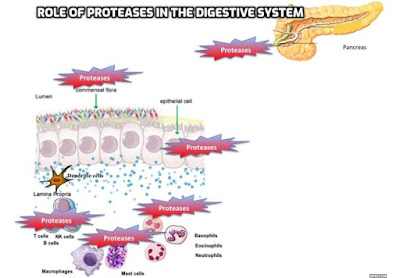Trypsin and Chymotrypsin as Proteolytic Enzymes
In the complex landscape of digestive enzymes, trypsin and chymotrypsin are two formidable players, each with its own distinct role in the breakdown of dietary proteins. Together, they ensure that we derive the maximum nutritional benefit from the proteins we consume.
Trypsin
Trypsin, produced and released by the pancreas, is a serine protease that plays a crucial role in the small intestine. Its primary function is to continue the digestion of proteins that began in the stomach.
Here’s how trypsin works:
- Activation: Trypsinogen, the inactive form of trypsin, is released by the pancreas into the small intestine. Once in the intestinal lumen, it encounters an enzyme called enterokinase, which converts trypsinogen into its active form, trypsin.
- Protein Hydrolysis: Active trypsin then goes to work, breaking down proteins into smaller peptides. It does so by specifically cleaving peptide bonds next to the amino acids lysine and arginine. This specificity ensures that large protein molecules are efficiently broken into manageable pieces.
- Amino Acid Release: These peptide fragments are further processed by other proteolytic enzymes and eventually reduced to individual amino acids. These amino acids are then absorbed through the intestinal lining into the bloodstream, ready to be utilized throughout the body.
Chymotrypsin
Chymotrypsin, like trypsin, is also a serine protease produced by the pancreas. However, it has a distinct substrate specificity, which means it cleaves peptide bonds at different locations within protein molecules.
Here’s how chymotrypsin functions:
- Activation: Similar to trypsin, chymotrypsin is secreted in its inactive form, chymotrypsinogen. It undergoes activation in the small intestine, but this time it is activated by trypsin itself.
- Protein Cleavage: Once activated, chymotrypsin begins hydrolyzing proteins. It targets peptide bonds adjacent to bulky, hydrophobic amino acids like phenylalanine, tryptophan, and tyrosine. This specificity allows chymotrypsin to cleave proteins at specific locations, further breaking them down into smaller peptides.
- Final Breakdown: Just as with trypsin, the smaller peptides produced by chymotrypsin are eventually broken down into individual amino acids, ready for absorption and utilization.
Synergistic Digestive Team: Trypsin and Chymotrypsin
The collaboration between trypsin and chymotrypsin in the digestive process is a testament to the intricacies of our biological systems. Together, they create a well-coordinated system that efficiently handles the diverse range of proteins found in our diets.
Optimal Conditions
Both enzymes operate optimally in the slightly alkaline environment of the small intestine. This pH is maintained by the secretion of bicarbonate ions from the pancreas, which neutralizes the acidic chyme that enters the small intestine from the stomach. These conditions are meticulously regulated to ensure the enzymes’ peak efficiency.
Role in Health
Beyond their vital role in digestion, trypsin and chymotrypsin contribute to overall health. Amino acids produced through their actions are essential for protein synthesis, enzymatic activity, and the functioning of numerous biological processes.
Maintaining Enzyme Balance
While trypsin and chymotrypsin are essential for protein digestion, maintaining a delicate balance of digestive enzymes is crucial. Excessive or inadequate production of these enzymes can lead to digestive issues. The body tightly regulates enzyme activity through feedback mechanisms, ensuring that digestion remains efficient and safe.
Digestive Disorders and Enzyme Deficiencies
Some medical conditions, such as chronic pancreatitis, cystic fibrosis, or certain genetic disorders, can lead to enzyme deficiencies. These deficiencies may result in poor protein digestion and malabsorption of essential nutrients. Individuals with these conditions often require enzyme replacement therapy to supplement their natural enzyme production.
Optimizing Digestive Health
For those without underlying digestive disorders, maintaining optimal digestive health can be achieved through a balanced diet rich in protein sources. Ensuring an adequate intake of dietary fiber, fluids, and probiotics can also support digestive processes.
Supplementation
For individuals with digestive issues or enzyme deficiencies, digestive enzyme supplements containing trypsin, chymotrypsin, and other enzymes can be beneficial. These supplements help compensate for enzyme deficiencies, aiding in the efficient digestion of proteins.
Watch this video – 18 Foods Rich in Natural Enzymes That Will Improve Your Digestion
Conclusion: A Dynamic Duo in Digestion
In summary, trypsin and chymotrypsin are instrumental in the digestion of proteins in the small intestine. These proteolytic enzymes work together harmoniously to ensure that dietary proteins are broken down into their constituent amino acids, providing the body with the essential nutrients it needs for growth, repair, and overall well-being. Understanding their roles underscores the importance of proper digestion in maintaining optimal health.

